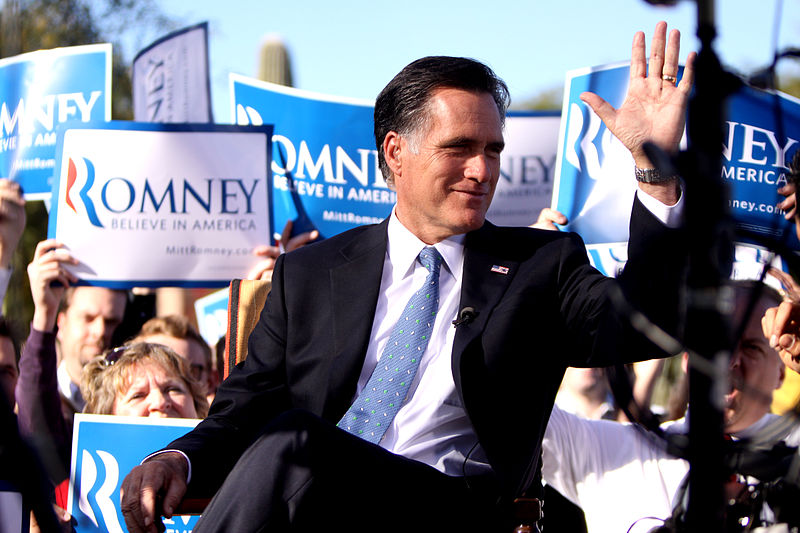Obama Spins Mitt Around the World in Round Three
Psst Mitt, this was supposed to be the foreign policy debate.
I do have to hand it to the guy. If the facts aren’t on your side, you might as well make up a good story. And that’s exactly what Romney set out to do last night. In almost comical fashion, the governor at multiple times shifted the debate away from foreign policy to discuss how terrible the economy has been.
He spelled out his five-point plan, repeated several times the fact that unemployment was not at 5.4 percent, and again reminded us that many Americans were still out of work. Twelve million jobs under a Romney presidency! These attacks were strong, powerful, and, not new. Because he said them all at Hofstra. And in his stump speech. And at the RNC. And during the GOP primary.
Usually, repeating the same attack lines would be acceptable. After all, this election is undoubtedly about the economy. But there is an issue called “world affairs” that merits at least a little bit of attention, one would think. Terrorism might be important for some people, as is the Arab Spring and a medium sized theocracy called Iran.
Yeah. For once, the economy might have to take a back seat.
Looking a lot like Obama in the first debate, Romney looked like he wanted to be doing anything else but discuss foreign policy in a meaningful way. He pivoted to the economy, relayed vague “policy” visions without any specifics (not all that new), and then capped the whole affair off by actually borrowing something from the 80s, Reagan’s “Morning in America”. This was clearly a guy who didn’t want to be there. He wanted to repeat talking points from his stump speech and reinforce the image that he is the “optimist” and future hope for this country, that he is the moderate. Seeming to forget the purpose of debates is to point out differences and flaws in the other candidate, Romney even whined that Obama was attacking him too much.
And Obama, for his part, didn’t let Romney off the hook. He held the man accountable for the few specifics the governor has laid out in the realm of foreign policy. Landing sharp barbs on Russia, Romney’s ignorance in the workings of the military, and the auto bailout (they really did get off topic), Obama took the fight to Romney.
The President parried the majority of attacks, was quick to point out when Romney agreed with him, when he didn’t, and why “agreeing” from behind isn’t the same as leading.
So what was Romney thinking during the precious minutes when he was actually talking about foreign policy? Was he simply trying to pass a metric that he could be commander-in-chief?
I think the answer is yes. He was trying to look like he could handle foreign policy, at least competently, while then returning to his sweet spot; the economy. But the question you all should ask yourself is this: What is the “commander-in-chief” test?
This is what I saw: A man who didn’t present any specifics, basically agreed with the President after the fact, and said he wasn’t going to go to war. Is that the definition of a good Commander-in-Chief? I hope not.
Going back to my earlier point. It’s easy to agree with someone after they’ve had success. Romney agreed with the President on Bin Laden… after we got him. He agreed with the President on Iran… after presented with the alternative of war. He agreed with the President on Iraq… after we withdrew. He agreed with the President on Afghanistan… after the President set a timetable. But a mediocre high school physics student with a textbook can agree with Albert Einstein -- that doesn’t make him Albert Einstein.
You need plans. You need specifics. You need goals, and real ways to achieve them, and the President has plans, has specifics, has the goals, and has reached many of them.
It was Denver v2.0, only with the tables turned. Romney clearly thought he had to merely play it safe and pass an abstract “litmus test”, while Obama was out to show that this guy is not ready to wield the might of the most powerful nation in the world. The problem is, Mr. Governor, prevent defenses don’t work, and you aren’t up by that much (if at all).
So will this debate matter? On one hand, people don’t care about foreign policy all that much this cycle. On the other, the debate provided one of the first, and definitely most extensive, conversations about world affairs. For the average voter, this might be the first, and only time they will hear anything about Russia, Iran, or China. The opportunity to break new ground exists for both candidates. And tonight, at least, it is clear Obama wrote the narrative.
So what are you doing in two weeks?

